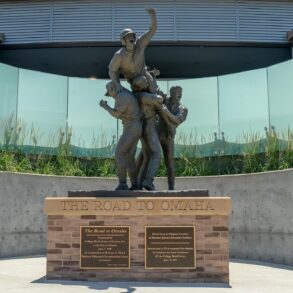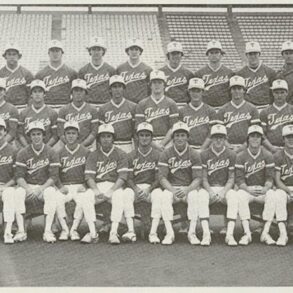Coach Dan Heefner had a question.
It was the first week of school at Dallas Baptist University (DBU), and the August sun was hot over the small Christian campus nestled into the hills along a shimmering lake on the outskirts of Dallas. Heefner ducked into an air-conditioned meeting room near the baseball field and stood in the front. The room was packed with young men.
Unexpectedly for DBU’s size, these men form one of the best teams in college baseball.
“Who are you?” Heefner said.
They are student athletes. Baseball players. They want to go to the College World Series. But Heefner, head coach of the team since 2008, thinks it’s important for them to realize they aren’t just athletes.
“If your identity is that you’re a baseball player,” he said, “you’re going to need it: ‘I have to be drafted. I have to play. I have to be an all-American.’ You need it. That’s a heavy burden. You can be on top of the world, and you can crash fast.”
Then he started talking about Paul in the Bible—“a high-drive guy”—and how he was very successful at what he did but had to find himself, his real identity, in Christ.
“Christ died for our sins according to the Scripture and rose on the third day,” Heefner said, quoting 1 Corinthians 15 from memory. He kept going, rattling off the whole passage.
Then he had had another question.
“What are we trying to do here? What is the most important thing?” Heefner asked the room.
“Be present,” said one player.
“Be a man built for others,” said another.
It’s the kind of answer you learn by heart if you play for Heefner. Alumni of the small school’s baseball program repeat it frequently when asked to explain the success of the team, what it meant to them to play for Heefner, and how it shaped them. They say being a “man built for others” is about humility, and humility is a pillar of the program.
DBU is, in many ways, a humble school. About 2,400 students live on DBU’s campus, which is small enough that they can walk from one end to the other in just a few minutes.
But the baseball team is something else. The DBU Patriots have made it to the Division I playoffs 13 out of the past 17 seasons that Heefner has coached. In that time, the team has a remarkable .667 winning record. The only other teams to have that kind of success are elite programs at comparatively massive universities. Louisiana State University has an undergraduate enrollment of 33,000. Texas A&M has 61,000.
But this modest Christian school is a baseball powerhouse. It is one of the top ten schools producing major-league draft picks. Players come into Heefner’s program wanting to go to the major leagues, and many have made it to the top.
But he reminds them, over and over, that getting to the majors is not really what this is all about.
“A big verse for us as a program has been Psalms 115, which says, ‘Not to us, O Lord, not to us, but to your name be the glory because of your love and faithfulness,’” Heefner told CT.
He recited the verse from memory, sitting in his office at DBU. The office is probably not that different from a lot of college coaches’ offices, with trophies from triumphs past and pictures of his family and former players. But the shelves are also full of theology books from Jerry Bridges, Tim Keller, and others.
“That [verse] brings up the next question: What does that mean, to glorify God?” Heefner said. He answered his own question with another verse off the top of his head, Isaiah 43:7, saying, “‘Everyone who is called by my name, whom I created for my glory.’ He created us to glorify him.”
Glorifying God is reflecting God’s attributes, he explained.
“Should we be striving to be great on the field? Absolutely! Because we’re trying to imitate him,” he concluded.
Heefner himself played for Elliot Johnson, who is in the coaching hall of fame, and learned a lot from him about coaching and being a Christian. Today, Heffner is a remarkable coach, especially when he teaches hitting, alumni of the program said. Other schools have tried to recruit him away from DBU, but he has stayed because he likes how openly he can integrate faith into the rhythm of the team. You can’t talk to him for more than a few minutes before he’s weaving paragraphs of Scripture into conversation.
For Heefner, integrating faith into training is essential for a group of young men to be happy playing baseball together. He really cares about players’ friendships. Heefner thinks players listen to each other more than they do to coaches, so those relationships are key.
The baseball players live in townhouse dorms together. And most of them participate in a voluntary program called The Oaks—a spiritually focused group for the team led by players and former players.
Tom Poole, a senior and a slugger, said those were the things that drew him from Calgary, Canada, to play for DBU. He started out at a school that was not religious but then transferred to DBU.
The Christian discipleship aspect was new and “what I needed,” Poole said in an interview. Last season he was the team’s designated hitter and was very active in The Oaks’ study group, where he has found deep friendships with his teammates.
“I can’t get enough of it,” Poole said. “The baseball game is cool, but being with everyone else is way cooler.”
Part of what Heefner is offering his players is a vision of biblical masculinity that pushes them to be their best—and remain humble.
Heefner said there was a time when he was worried humility wasn’t a useful virtue in baseball. He said to himself, “We’ll stink if we have a bunch of humble baseball players.” But then he was convicted that the Bible talks about humility constantly and he couldn’t pick and choose what parts he liked.
Humility, in his view, is critical to being a team. The way Heefner talks about biblical humility to his players is being “others focused.” You can be humble and strive to be great. You can be humble and be part of a great baseball team.
“If we create an environment where you can reach your full potential, and then at the same time you’re totally sold out to being a great teammate, it’s an unbelievable place to show up to every day,” he said.
Baseball people might say Heefner’s a master of player development. But Heefner calls it discipleship. For him, discipleship should be players’ top priority, then their college education is next. Winning baseball games comes third.
Winning’s still important, though. The team attracts good players because of Heefner’s proven record of making them better. Nate Frieling, who was a coach under Heefner and is now senior associate athletic director at DBU, sees an evangelistic logic to this.
“If he … doesn’t help them get better at baseball, they’re not going to care what he has to say about his faith or the Bible,” Frieling said.
Players often find relief in Heefner’s Christian message. The pressure to please their coaches, their parents, their teammates, and potential big-league scouts is constant. But he tells them to “honor, glorify, and please God” and then “trust him with the results.”
It’s not the typical way colleges recruit top players. This is especially true now that NCAA rules allow players to transfer to different schools without penalty. Since athletes can also make money from their personal brands, known as their name, image, and likeness (NIL), and since NIL collectives have formed around big programs to recruit and pay players, bigger schools draw bigger funding, promising bigger payouts to potential players.
That’s a problem for small Christian colleges. What they have to offer, instead, is deeper relationships and spiritual discipleship. That’s always been the special ingredient at DBU. While DBU’s baseball program has a hot reputation, Heefner makes clear in recruiting that Christian discipleship is a big part of what the team does.
He’ll help players get better at baseball. But he’s also going to teach them the Bible’s answer to the question “Who are you?”
It worked for Matt Duce. He was a catcher on the team from 2015 to 2018. He was drafted by two major-league teams and played in the minors for the St. Louis Cardinals.
He said he noticed that many first-round draft picks didn’t have great relationships with their coaches or teammates. They always had the mentality that they wanted to move on quickly, move up to the next level. That wasn’t true at DBU. Duce had nine groomsmen in his wedding: One of them was his brother, and the other eight were DBU baseball players.
“When I got here at 18, I saw a coach that had pretty much memorized the Gospel of Matthew, and he was incredible coach,” said Duce, now the athletics director at DBU. “And it just clicked. It was what I had been searching for all these years.”
Alumni of the baseball program recite the same Bible verses Heefner does, like Psalm 115:1 (“not to us, Lord”) and Isaiah 43:7 (“created for my glory”).
Duce quoted John 15:5, where Jesus tells his disciples to abide in him.
“We should all just be having an abiding relationship with Christ,” he said. “And then, because of that relationship, you can go hit a ton of home runs and do so for a greater glory.”
He laughed and added, “It’s fun to be good.”
DBU will play the first game of the season against North Dakota State on February 14. The game will be broadcast on ESPN+.
This post was originally published on this site be sure to check out more of their content.











